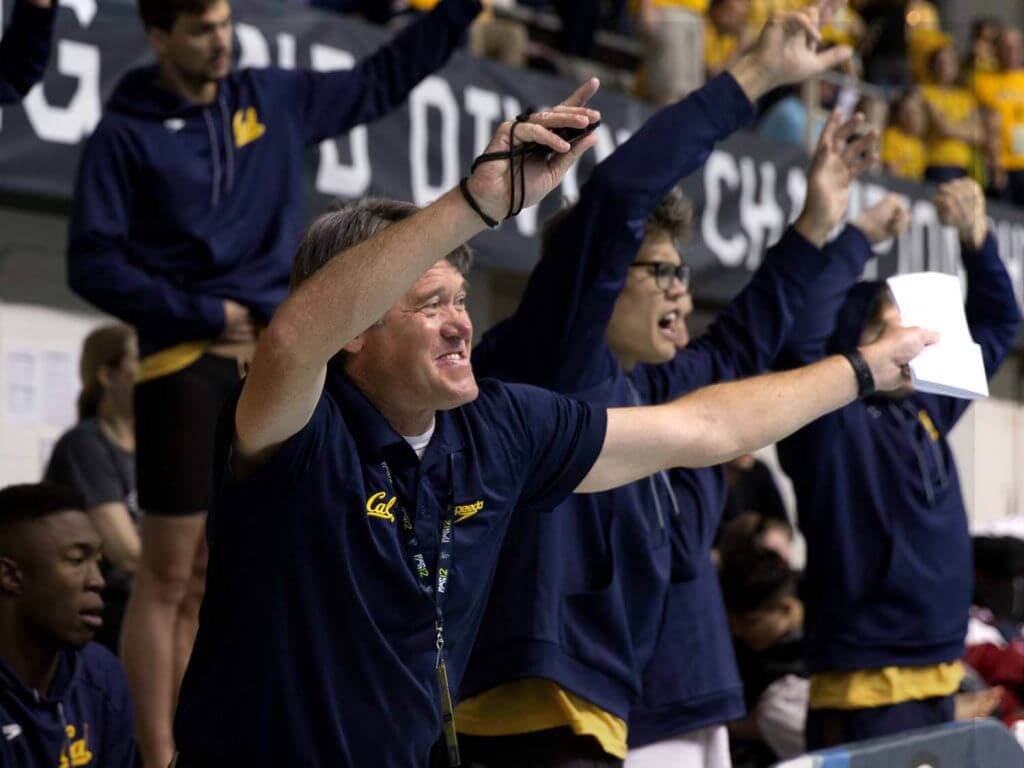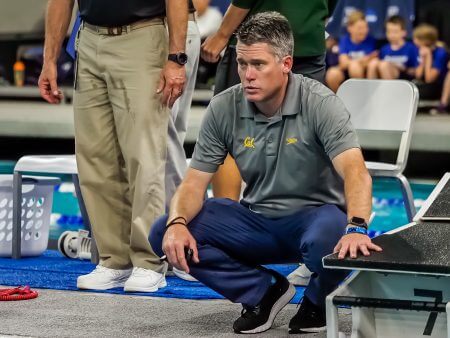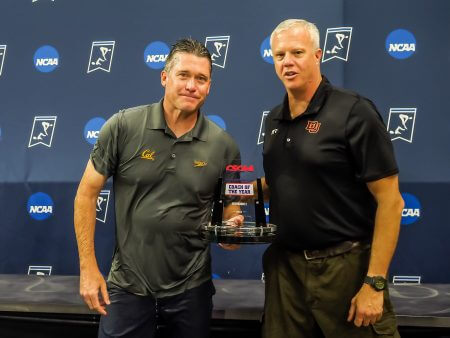Dave Durden Impacting Swimming and Lives Through Coaching

Dave Durden (From May’s Swimming World Magazine)
Dave Durden, University of California and U.S. national team coach, simply refers to himself as a swim coach. But he’s also a leader, an expert at maximizing performance, removing doubt, instilling confidence and navigating young men through demanding situations.
**********
The entire four-day event was a Golden Bear showcase, a dominant performance as California won the 2019 NCAA men’s swimming and diving championship, the program’s fourth team title in nine years, but its first since 2014. The all-around dominant effort included a virtuoso performance from senior Andrew Seliskar, who fulfilled years of potential to win three national titles, the first of his career, and legions of Cal fans and alumni roared their approval of the Bears’ swims session after session.
But the enduring image of the meet came in a typically quiet moment, when Cal sophomore Daniel Carr had an opportunity to reswim the 100 back. He swam by himself in lane one, directly in front of his team cheering section, and he threw down a lifetime best by more than a half second to claim the fourth seed overall for the final.
As Cal men’s coach Dave Durden watched Carr touch the wall, he screamed in excitement—and lost his footing on the slippery pool deck. Durden ended up on his knees, still celebrating the performance as if nothing had gone wrong. But other than that one very literal slip-up, the Golden Bears were impeccable.
That’s the Cal modus operandi: always perform at or above full strength at the NCAA Championships. Durden has been at Cal since the 2007-08 season, and in every year after his first two, Cal has finished first or second in the national rankings. Ten years straight. That is, until 2020, when circumstances derailed the Bears’ opportunity to defend that championship.
Maintaining Perspective

Dave Durden — Photo Courtesy: Peter H. Bick
The COVID-19 pandemic that has crippled life throughout the United States and the entire world claimed the NCAA Swimming Championships as an early casualty. When the news of the cancellation broke, about two weeks before the meet, Durden spoke to his team about their “social and moral responsibilities” to the world, which would require putting their athletic responsibilities on hold.
“Our top 12 guys, we felt, were as good or better than anyone else in the country, and we felt good about going into NCAAs and showing that,” Durden said. “I think like any 18-to-22-year-old athlete, they’re going to take that moment as a disappointment, but they’re able to redirect very quickly. We’re a pretty nimble group. We’re a pretty active group. We can handle some adaptation pretty quickly, and we’re ready to adapt to the next thing.”
So instead of sulking around and feeling sorry for themselves, the Cal team maintained perspective on the situation as a whole. Sure, they had every right to be disappointed to lose out on NCAAs, but they appreciated the process that had put them in position to be successful and moved on. That’s a maturity so valuable in swimming, a sport that requires grueling dedication, but even more patience.
“That’s more a characteristic of the campus than it is our team particularly, and I think we try to embody that,” he said. “There’s a level that they have of calmness in these situations as a group or as individuals or as a team that we’re going to work through it and figure it out.”
Great teams succeed and excel and win, and they also handle difficult situations with poise and aplomb. But all teams take on the identity of their leader. How the Cal men’s team handled losing the opportunity to defend their NCAA championship tells us all we need to know about Durden, perhaps more than the 10 consecutive top-two NCAA finishes of the last 10 Marches. Becoming one of the country’s premier swim coaches has involved much more than coaxing lifetime bests out of college-aged men.
Dave Durden the Swim Coach
Ask for a short list of the top coaches in the United States or even the world, and Durden is a sure bet to make the cut. Cal-trained athletes coming up big at the most significant meets has become the norm, even internationally. Think Ryan Murphy, who swept the backstroke events at the 2016 Olympics, or Nathan Adrian, who has swum with Durden since 2008 and is one of the premier sprinters in American history. U.S. national teams teem with swimmers Durden has coached, and those Cal swimmers share some key traits: remarkably similar butterfly technique, an acute confidence and full trust in Durden.
Durden speaks often about building relationships with his swimmers and growing those relationships over the course of their college swimmers and beyond as they transition into adult life or remain at Cal as professional athletes. But in his own eyes, he’s not first and foremost a mentor or a teacher or anything of that sort.
“I’m a swim coach. That’s the thing I identify with,” he said. “That may encapsulate teacher, mentor, etc., but, man, I’m a swim coach. My knowledge base is surrounded in this sport, and I do think that there are things that you can apply to life, to what you’re doing in the professional world, etc., etc. There are important things in this, but I’m by no means an expert in those areas. I spend a lot of time coaching swimming, and that’s what I know, and that’s what I want to know. That’s what I want to do. That’s what I want to do really well.”
As with most coaches, Durden has training tactics that he regularly employs during pool time, including sets and drills that he likes, but he often thinks outside the box for skills that might give his athletes an edge. For instance, Durden previously enlisted sports psychologist Ken Ravizza to speak with his team several times a year, and Durden and his swimmers named Ravizza as a key component of the program’s success.
Ravizza, who worked with athletes across several different sports before he died in 2018, brought a different perspective to the pool deck. Durden wanted his swimmers to learn the same skills that basketball players use when they miss a free throw and have to instantly shake it off and get ready for the next play—except because swimming races happen so quickly, swimmers would have to apply that mindset ahead of time. Ravizza helped these swimmers build their edge and develop resiliency.
“It was interesting to have those conversations with him,” Durden said. “It just really helped me provide a proper framework in communicating to our guys either individually or as a group.”

Dave Durden was named coach of the meet at the 2019 NCAA championships — Photo Courtesy: Peter H. Bick
Durden coaches each individual a bit differently, based on the relationship with a particular athlete and their shared experiences as a coach-swimmer duo. When a swimmer is struggling, there’s no one-size-fits-all strategy for helping them rebound. Maybe it’s working to build their confidence or maybe it’s honing in on a particular skill.
The one simple piece is the common ambition of all swimmers, from the 18-year-olds arriving at Berkeley’s campus each September to the 31-year-old sprinter (Adrian) aiming for his fourth Olympics.
“It’s wanting to swim a best time,” he said. “It’s something that they’ve done hundreds of times. There’s comfort and confidence that you can take.”
That’s why Durden coaches: to help athletes push the right buttons to achieve speed they never have touched and, thus, reach the intimately familiar and welcoming feeling of a lifetime best—also, of course, because of the lives he gets to impact along the way.
“Working with these guys in this particular age group, it’s just an absolute blast,” he said. “I enjoy the conversations I have with our guys when they’re 18 as freshmen. I enjoy it when they’re 24, 25, 26, and they’re out in the working world, and they come back to campus. I just enjoy what I’m doing so much, and it’s because of the people that are in it.”
Ready for the New Challenge
The first time Dave Durden helmed a senior U.S. national team as men’s head coach, the results were far from exceptional. The American men won just two gold medals at the 2015 World Championships in Kazan. Two years later, Durden had again been named head coach for the 2017 World Championships, and he joked, “Well in 2015, we had a terrible head coach for the men…screwed up every relay. He’s going to get that right in 2017.”
Indeed, those Budapest Worlds turned out to be a dominant performance for the Americans, who won 18 gold medals and 38 medals overall in the pool. After that all-around drubbing of the rest of the world and given their swimmers’ continued excellent performances, it was a fait accompli in December 2018 when Durden and Greg Meehan were named head coaches for the U.S. men and women, respectively, for the 2020 Olympics in Tokyo.
Well, make that 2021.
With the Olympics postponed, Durden said, “I’m going to be the longest named Olympic coach in the history of our sport today. I probably could be wrong with that, but I’m going to be coming up on the better part of three years by the time we get to August 2021.”
When considering his Olympic appointment, Durden reflected to his first memory of watching U.S. swimmers in the Olympics, back during the 1984 Games in Los Angeles, when he first became a fan of American swimming. The newest challenge to the Olympic appointment is one he never envisioned even a few months earlier, before the COVID-19 crisis, of having to put preparations for 2020 on hold and re-channel that energy for 2021. But Durden’s voice still dripped with passion for the task ahead.
“It’s a challenge, and I understand that like any professional challenge, you’re going to come out of that better. It may not be fun at the time,” he said. “Still, I am as invigorated by that challenge now as I was 12 months ago. I’m excited for this, I’m ready for this, but I also understand that it’s a challenge. Both Greg and I are going to rely upon our country, the numerous great coaches that we have in this country, to prepare their athletes, to get them ready to go, to allow them to perform (at Trials) in Omaha and allow them to perform in Tokyo.”
It won’t be until late June 2021, when the Olympic team is finally assembled, that Durden will take on his responsibilities in full. That’s when he will have to take a group of men from across the country—many of them his own swimmers, but many from other coaches who have beaten Cal swimmers—and galvanize them into a team. He will have to push the right buttons, similar to his day job at Cal, but in a more condensed period, in hopes of upholding the American tradition of swimming excellence at the Olympic Games.
And Durden will have the group of U.S. swimmers prepared and ready to compete.



